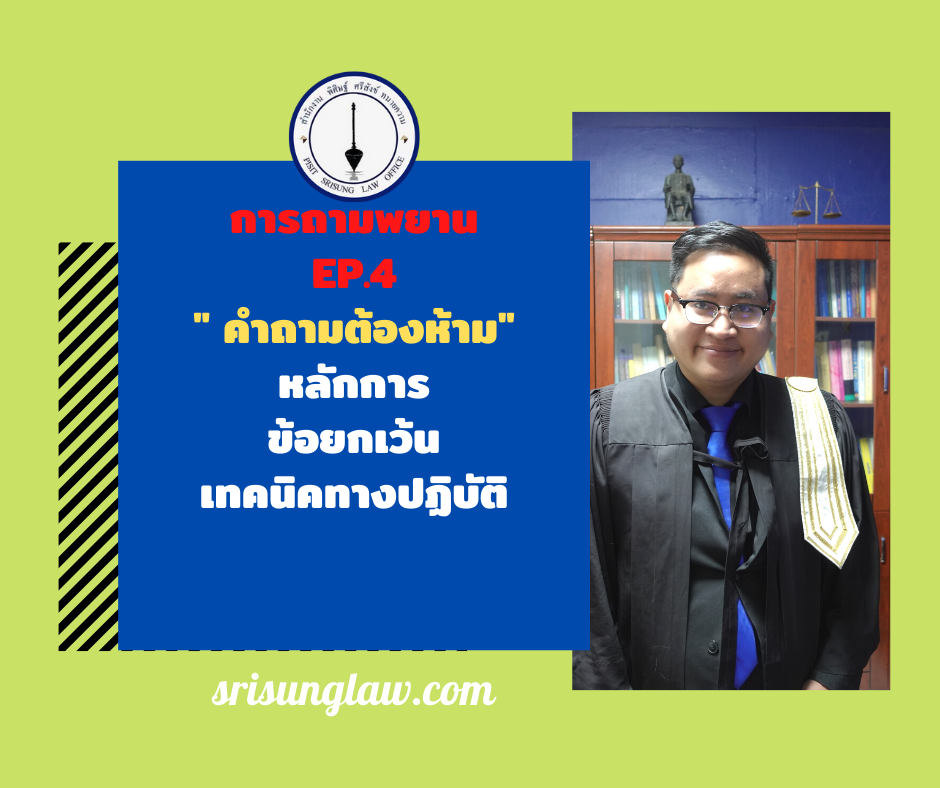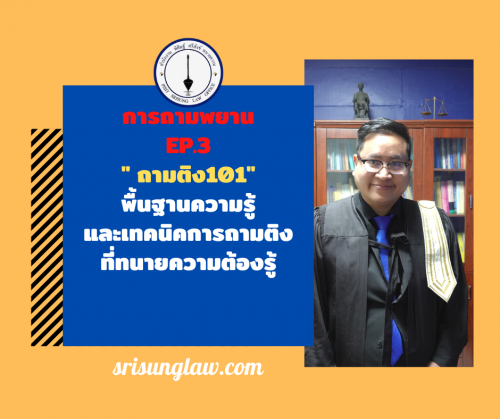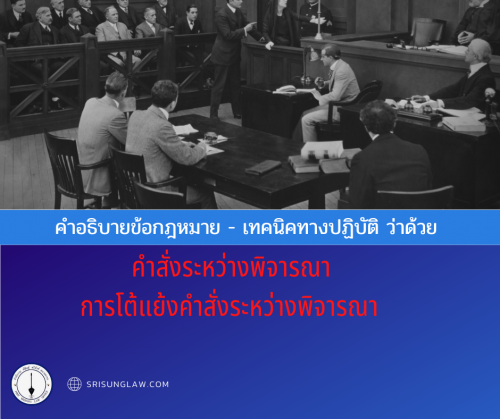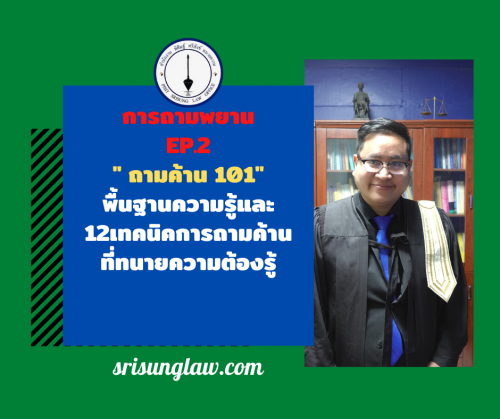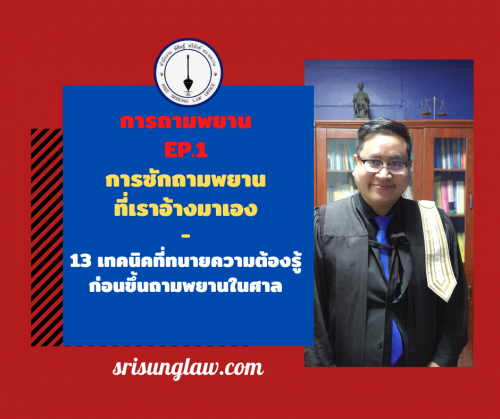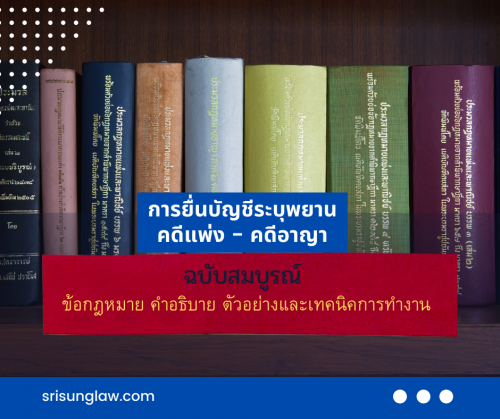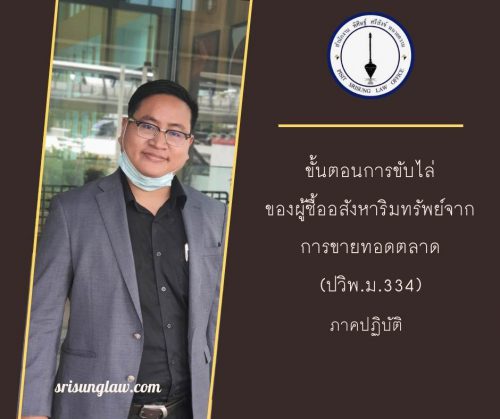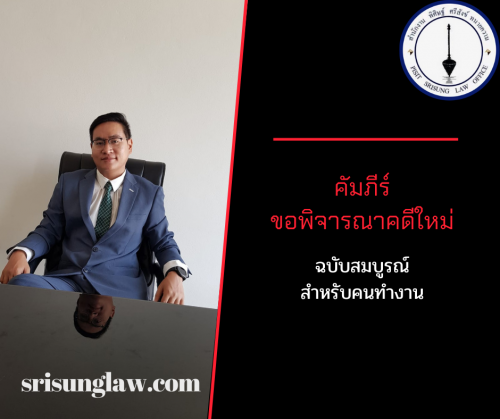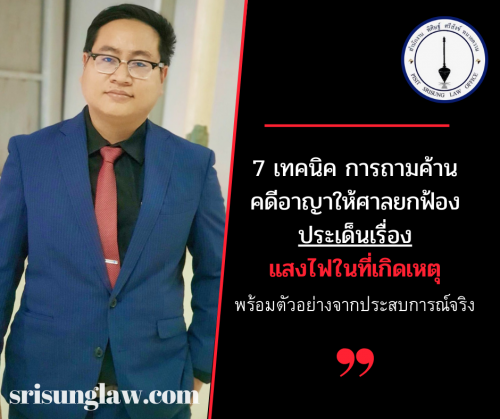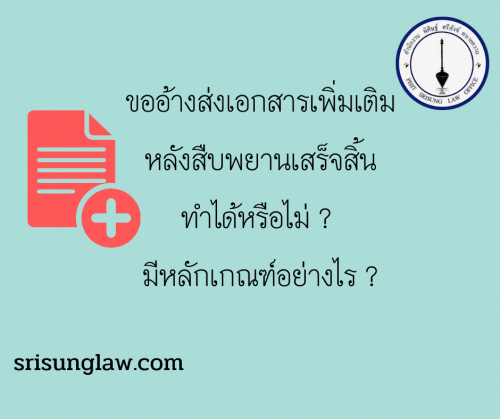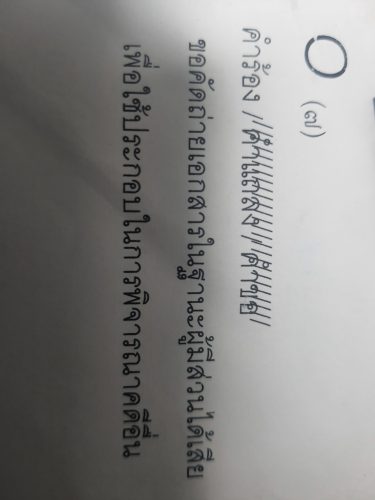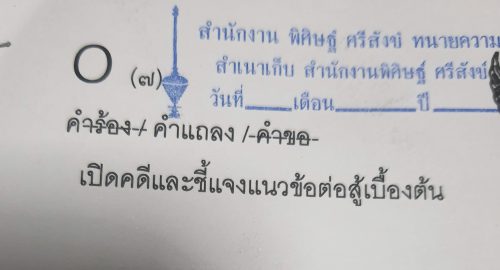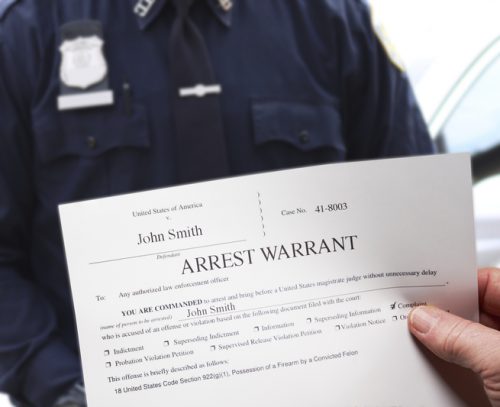ผมได้ทำบทความและคลิปวีดีโอเกี่ยวกับเรื่องเบสิคพื้นฐานในการว่าความตั้งแต่การซักถาม ถามค้าน และถามติง ไปแล้ว
วันนี้ผมจะมาพูดถึงเรื่องเทคนิคทางปฏิบัติอีกข้อหนึ่งซึ่งเป็นเรื่องที่ เป็นพื้นฐานที่สำคัญมากสำหรับทนายสายว่าความที่จะต้องรู้
เรื่องดังกล่าวก็คือ คำถามที่กฎหมายห้ามไม่ให้ทนายความถามพยานในชั้นศาลโดยจะอธิบายอย่างละเอียดทั้งเรื่องหลักการ ข้อยกเว้น และเทคนิคทางปฏิบัติ เพื่อใช้สำหรับเป็นคู่มือศึกษาและการทำงานของทนายความครับ
คำถามที่ห้ามไม่ให้ทนายความถามพยานในศาล
ในการซักถาม ถามค้าน หรือถามติง ทนายความมีข้อห้ามอยู่หลายอย่างในการถาม
วัตถุประสงค์เพื่อให้เกิดความเป็นธรรม และค้นหาความจริงในคดีเป็นไปโดยมีประสิทธิภาพ
หากทนายความใช้คำถามต้องห้ามดังกล่าว ศาลอาจไม่อนุญาตให้ถาม และพยานก็มีสิทธิไม่ตอบคำถามได้ หรือหาพยานได้เผลอตอบไปศาลก็จะไม่จดคำตอบให้
คำถามต้องห้ามดังกล่าวมี 5 ประเภทดังนี้
1.ถามพยานด้วยคำถามที่ไม่เกี่ยวข้องกับประเด็นในคดี
หลักกฎหมาย
ประมวลกฎหมายวิธีพิจารณาความแพ่ง มาตรา ๑๑๘
ไม่ว่าในกรณีใดๆ ห้ามมิให้ คู่ความ ฝ่ายใดฝ่ายหนึ่ง ถามพยาน ด้วย
(๑) คำถาม อันไม่เกี่ยวกับ ประเด็นแห่งคดี
คำอธิบาย
ข้อห้ามเรื่องนี้ เป็นข้อห้ามเด็ดขาด และห้ามทั้งการซักถาม ถามค้าน ถามติง
ทั้งนี้ในการถามพยานในศาลของทนายความหรือคู่ความนั้นจะต้องเป็นการถามเพื่อให้เกิดประโยชน์กับรูปคดีของตนเอง เพื่อสนับสนุนคำคู่ความหรือข้อต่อสู้ของตนเองหรือเกี่ยวข้องกับประเด็นข้อพิพาทเท่านั้น
ทนายความหรือคู่ความไม่มีสิทธิถามคำถามซึ่งไม่เกี่ยวข้องกับประเด็นข้อพิพาทของคดี ถามเล่นๆ ถามเพราะอยากรู้ ถามเพื่อเอาใจลูกความ ถามเพราะว่าไม่รู้ว่าจะถามว่าอะไร ฯลฯ ถือว่าเป็นคำถามที่ไม่เกี่ยวข้องกับประเด็นแห่งคดี
หากถามพยานด้วยคำถามดังกล่าว อาจจะถูกศาลตัดเตือนไม่ให้ใช้คำถาม และพยานก็มีสิทธิที่จะไม่ตอบคำถามได้ หรือหาพยานตอบคำถามแล้วศาลก็อาจจะไม่จดบันทึกคำตอบ
ทั้งนี้หากปล่อยให้ทนายความหรือคู่ความถามพยานด้วยคำถามแบบไหนก็ได้ทั้งๆที่ไม่เกี่ยวข้องกับประเด็นข้อพิพาท การถามพยานก็คงซักถามกันแบบเรื่อยเปื่อยไม่จบสิ้น และไม่เกิดประโยชน์แก่คดีความแต่อย่างใด
อย่างไรก็ตามประเด็นเรื่องคำถามว่าเกี่ยวข้องกับประเด็นข้อพิพาทนั้น มักจะเป็นปัญหาที่จะเป็นข้อถกเถียงกันอยู่บ่อยครั้ง ระหว่างทนายความทั้งสองฝ่าย และกับศาลที่นั่งพิจารณาคดี
เพราะคำถามบางคำถามที่ดูแล้วเหมือนจะไม่เกี่ยวข้องกับประเด็นข้อพิพาท หรือห่างไกลจากประเด็นข้อพิพาทไปมากแต่ความจริงแล้วอาจจะมีความสำคัญหรืออาจจะมีความจำเป็นที่จะต้องถามก็ได้
ดังนั้นแล้วหากเราเป็นทนายความฝั่งที่ถามพยาน เราจะต้องพร้อมที่จะอธิบายได้อยู่เสมอว่าคำถามของเราที่ถามพยานไปนั้นเกี่ยวข้องกับประเด็นข้อพิพาทอย่างไร เพื่อที่สามารถชี้แจงได้หากถูกฝ่ายตรงข้ามโต้แย้งคัดค้าน หรือถูกศาลท้วงติง
ตัวอย่างคำถามที่ไม่เกี่ยวข้องกับประเด็นข้อพิพาท เช่น
- มีแฟนหรือยัง
- ชอบกินอะไร
- ถามรสนิยม
- ถามเรื่องครอบครัว
- ดินฟ้าอากาศ
- ถามเรื่องที่ไม่เกี่ยวข้องอะไรเลยกับผลแพ้ชนะหรือพิสูจน์ความจริงในคดี
ซึ่งสุดท้ายคำถามนั้นจะเกี่ยวข้องกับประเด็นข้อพิพาทหรือไม่ ไม่ได้ขึ้นอยู่กับตัวคำถามนั้นอย่างเดียว แต่จะต้องอาศัยบริบทภาพรวมโดยคดีมาประกอบกัน
” ถามค้าน 101 ” – รวมพื้นฐาน 12 เทคนิคการถามค้าน ที่ทนายความต้องรู้ก่อนขึ้นว่าความ
2.ห้ามถามคำถามที่เป็นการหมิ่นประมาทพยาน
ข้อกฎหมาย
ประมวลกฎหมายวิธีพิจารณาความแพ่ง มาตรา ๑๑๘
ไม่ว่าในกรณีใดๆ ห้ามมิให้ คู่ความ ฝ่ายใดฝ่ายหนึ่ง ถามพยาน ด้วย
(๒) คำถาม ที่อาจทำให้ พยาน หรือ คู่ความ อีกฝ่ายหนึ่ง หรือ บุคคลภายนอก ต้องรับ โทษทางอาญา หรือ คำถาม ที่เป็น หมิ่นประมาท พยาน เว้นแต่ คำถามเช่นว่านั้น เป็นข้อสาระสำคัญ ในอันที่จะ ชี้ขาด ข้อพิพาท
คำอธิบาย
ธรรมดาแล้วพยานที่มาเบิกความที่ศาล ถือว่ามาช่วยศาลค้นหาความจริงในคดี ดังนั้นการถามพยานของทนายความหรือคู่ความในคดี จึงจะต้องให้เกียรติพยาน หาคำถามไหนเป็นคำถามที่หมิ่นประมาทพยาน ทำให้พยานอับอายเสื่อมเสียชื่อเสียง ย่อมเป็นคำถามที่ต้องห้ามไม่ให้ถามพยาน
ตัวอย่างคำถามที่เป็นการหมิ่นประมาทพยานเช่น
- พยานมีสามีหลายคนใช่ไหม
- พยานเป็นโรคเอดส์ เป็นกามโรคใช่ไหม
- พยานเคยถูกศาลลงโทษเรื่องอนาจารเด็กใช่ไหม
อย่างไรก็ตามข้อห้ามเรื่องนี้ ไม่ใช่ข้อห้ามเด็ดขาด ถึงแม้คำถามดังกล่าวจะเป็นคำถามที่เป็นการหมิ่นประมาทพยาน หากเป็นประเด็นสำคัญในคดี และมีความจำเป็นต้องถาม ศาลอนุญาตให้ถามได้
ตัวอย่างที่มีความจำเป็นต้องทำเช่น ถามเพื่อให้เห็นว่าพยานเป็นคนโกหก ไม่น่าเชื่อถือ มีความประพฤติในทำนองไม่ดี เพื่อชี้ให้เห็นว่าพยานไม่น่าเชื่อถือ เป็นต้น
3.ห้ามใช้คำถามที่จะทำให้พยาน /คู่ความอีกฝ่าย / บุคคลภายนอก ได้รับโทษทางอาญา
ข้อกฎหมาย
ประมวลกฎหมายวิธีพิจารณาความแพ่ง มาตรา ๑๑๘
ไม่ว่าในกรณีใดๆ ห้ามมิให้ คู่ความ ฝ่ายใดฝ่ายหนึ่ง ถามพยาน ด้วย
(๒) คำถาม ที่อาจทำให้ พยาน หรือ คู่ความ อีกฝ่ายหนึ่ง หรือ บุคคลภายนอก ต้องรับ โทษทางอาญา หรือ คำถาม ที่เป็น หมิ่นประมาท พยาน เว้นแต่ คำถามเช่นว่านั้น เป็นข้อสาระสำคัญ ในอันที่จะ ชี้ขาด ข้อพิพาท
ประมวลกฎหมายวิธีพิจารณาความอาญา มาตรา 234
พยานไม่ต้องตอบคำถามซึ่งโดยตรงหรืออ้อมอาจจะทำให้เขาถูกฟ้องคดีอาญา
เมื่อมีคำถามเช่นนั้น ให้ศาลเตือนพยาน
คำอธิบาย
อย่างที่บอกไว้แล้วว่า พยานที่มาเบิกความที่ศาลนั้นถือว่าเป็นบุคคลที่มาให้ความช่วยเหลือที่ทำให้เกิดความยุติธรรมขึ้น ดังนั้นบุคคลดังกล่าวจะต้องได้รับความคุ้มครอง การถามพยานด้วยคำถามที่จะทำให้พยานอาจจะได้รับโทษอาญาจึงเป็นคำถามที่ต้องห้าม
นอกจากนี้คำถามบางคำถามที่อาจจะทำให้คู่ความอีกฝ่ายหนึ่งหรือบุคคลภายนอกจะได้รับโทษอาญา ก็เป็นคำถามที่ต้องห้ามด้วยเช่นเดียวกัน ข้อห้ามดังกล่าห้ามเฉพาะในส่วนของคดีแพ่งเท่านั้น
นอกจากนี้ข้อห้ามดังกล่าวยังไม่ใช่ข้อห้ามเด็ดขาด หาคำถามเช่นว่านั้นเป็นคำถามที่สำคัญที่จะชี้ขาดข้อพิพาทในคดีแพ่ง ศาลอนุญาตให้ทนายความใช้คำถามก็ได้
แต่ในส่วนของคดีอาญาต้องห้ามเฉพาะคำถามที่จะทำให้ตัวพยานเองถูกฟ้องคดีอาญาเท่านั้น ที่เป็นคำถามที่ต้องห้าม ส่วนคำถามที่อาจจะทำให้บุคคลอื่นได้รับโทษอาญายังถามพยานได้ ตามประมวลกฎหมายวิธีพิจารณาความอาญามาตรา 234 และเป็นคำถามต้องห้ามแบบเด็ดขาดอีกด้วย
ตัวอย่างคำถามที่อาจจะทำให้ตัวพยานหรือบุคคลอื่นได้รับโทษทางอาญา เช่น
- ถามว่า พยานเองเป็นคนหยิบปืนใส่ให้จำเลยใช่ไหม
- ถามว่า พยานเป็นคนพิมพ์ข้อความที่หมิ่นประมาทหรือไม่
- ถามว่า รู้ใช่ไหมว่านาย ก. ก็เป็นคนยิงผู้ตาย
- ถามว่า รู้ไหมว่าโจทก์คดีนี้ก็ร่วมกับจำเลยกระทำผิด
4.ห้ามใช้คำถามนำในการซักถามหรือถามติงพยานของตนเอง
ข้อกฎหมาย
ประมวลกฎหมายวิธีพิจารณาความแพ่ง มาตรา ๑๑๘
ในการที่ คู่ความ ฝ่ายที่อ้างพยาน จะซักถามพยาน ก็ดี หรือ ถามติงพยาน ก็ดี ห้ามมิให้ คู่ความ ฝ่ายนั้นใช้ คำถามนำ เว้นแต่ คู่ความ อีกฝ่ายหนึ่ง ยินยอม หรือ ได้รับอนุญาตจากศาล
คำอธิบาย
ธรรมดาแล้วพยานที่มาเบิกความที่ศาล จะต้องมาเบิกความจากความรู้เห็นความทรงจำของตนเอง ไม่ใช่ท่องจำหรือจดจำเรื่องราวที่คนอื่นเล่าให้ฟัง
ดังนั้นในการถามพยานของฝ่ายเราเอง ไม่ว่าจะเป็นการซักถาม หรือถามติง จึงไม่ให้ใช้คำถามนำ หรือคำถามที่แนะนำคำตอบให้พยานทราบอยู่ในตัว
เพราะธรรมดาพยานฝ่ายที่เราอ้างมาเองนั้น พยานก็ล้วนแต่อยากจะตอบคำถามให้เป็นประโยชน์กับรูปคดีของฝ่ายเราอยู่แล้ว
หากปล่อยให้ใช้คำถามนำกันได้พยานก็ไม่จำเป็นจะต้องรู้เห็นจดจำเรื่องราวได้จริงๆแค่ตอบไปตามที่พยานถามนำก็ได้
ดังนั้นในการถามพยานฝ่ายที่เราอ้างมาเอง ไม่ว่าจะเป็นการซักถาม ถามติง กฎหมายจึงห้ามไม่ให้ทนายความหรือคู่ความถามโดยใช้คำถามนำ
การถามพยาน ตอนที่ 1 ” ซักถามพยาน ” – รวม 13 เคล็ดลับที่ทนายความต้องรู้ก่อนขึ้นถามพยานในชั้นศาล
คำถามนำคือ คำถามที่แนะนำคำตอบให้รู้อยู่ในตัว เช่น
- วันเกิดเหตุคือวันที่ 1 มกราคม 2565 ใช่ไหม
- วันเกิดเหตุแสงไฟสว่างมากใช่ไหม
- วันเกิดเหตุพยานเห็นจำเลยใช่ไหม
- จำเลยใส่เสื้อสีเหลืองใช่ไหม
- ฯลฯ
5.ห้ามถามติงในคำถามที่ไม่เกี่ยวกับเรื่องที่ตอบคำถามค้าน
หลักกฎหมาย
ประมวลกฎหมายวิธีพิจารณาความแพ่ง มาตรา ๑๑๘
ในการที่ คู่ความ ฝ่ายที่อ้างพยาน จะถามติงพยาน ห้ามมิให้ คู่ความ ฝ่ายนั้น ใช้คำถามอื่นใด นอกจากคำถาม ที่เกี่ยวกับ คำพยาน เบิกความตอบคำถามค้าน
คำอธิบาย
การถามติง มีวัตถุประสงค์เพียงอย่างเดียวเท่านั้น ก็คือเพื่อให้พยานอธิบายในเรื่องที่ตนเองได้ตอบคำถามค้านของฝ่ายตรงข้ามไป
ดังนั้นในการถามติง ทนายความหรือคู่ความจึงมีสิทธิ์ใช้คำถามได้เพียงประเภทเดียวเท่านั้น ก็คือคำถามเพื่อให้พยานอธิบายในเรื่องที่ตนเองได้ตอบคำถามค้านของฝ่ายตรงข้ามไป
ทนายหรือคู่ความไม่มีสิทธิ์ถามจึงพยานด้วยคำถามที่เป็นการตั้งประเด็นข้อเท็จจริงขึ้นใหม่ ให้พยานเล่าเรื่องใหม่ที่ไม่เกี่ยวข้องกับการตอบคำถามค้าน
เพราะหากให้ทำเช่นนั้นได้ก็เท่ากับให้พยานเบิกความใหม่ได้อีกครั้งหนึ่งซึ่งทำให้ฝ่ายตรงข้ามเสียเปรียบไม่มีโอกาสได้ซักค้านอีกรอบนึง
ตัวอย่างเช่น
หากฝ่ายตรงข้ามถามค้านพยานของเราเรื่องแสงไฟ พยานเราตอบคำถามค้านไป เราก็ถามติงเรื่องแสงไฟได้
หากฝ่ายตรงข้ามไม่ได้ถามเรื่องแสงไฟในที่เกิดเหตุเลย เราจะไปถามพยานให้เบิกความชัดเจนขึ้นไม่ได้ เพราะเช่นนั้นก็เท่ากับเป็นการให้พยานเบิกความข้อเท็จจริงขึ้นใหม่ ไม่ใช่การถามติงเพื่อแก้ข้อที่เบิกความถามค้านไป
หากฝ่ายตรงข้ามใช้คำถามต้องห้ามกับพยาน เราต้องทำอย่างไร
การใช้คำถามต่างๆที่ไม่ชอบด้วยกฎหมายเหล่านี้ มักจะทำให้ฝ่ายเราเสียเปรียบเป็นอย่างมาก
ตัวอย่างเช่นหากฝ่ายตรงข้ามใช้คำถามนำกับพยานของตนเอง ย่อมทำให้เราเสียเปรียบเพราะเท่ากับเป็นการแนะนำคำตอบให้พยานของตนเองทราบอยู่ในตัว
หรือฝ่ายตรงข้าม ใช้คำถามติงในเรื่องที่ไม่เกี่ยวข้องกับสิ่งที่พยานเบิกความตอบคำถามค้าน เช่นนี้ทำให้เราเสียเปรียบเพราะว่าเหมือนกับการเบิกความขึ้นใหม่ทำให้เราไม่มีโอกาสถามค้านอีกครั้งหนึ่ง
ซึ่งหากผู้พิพากษาบางคนเคร่งครัดในกระบวนพิจารณาก็มักจะคอยควบคุมการพิจารณาหรือห้ามการใช้คำถามที่ไม่ชอบด้วยกฎหมายต่างๆ
หากเจอผู้พิพากษาที่ไม่เคร่งครัดมากก็มักจะปล่อยผ่านให้ถามและจดบันทึกคำถามไปตามปกติ
หน้าที่ของทนายความเมื่อฝ่ายตรงข้ามใช้คำถามต้องห้าม
ทนายใหม่ๆหลายคน ยังไม่ค่อยรู้หน้าที่ของตนเองเพราะเป็นเรื่องที่ไม่มีสอนอยู่ในตำราสักเท่าไหร่ ก็เลยไม่ได้คัดค้านเวลาฝ่ายตรงข้ามใช้คำถามที่ไม่ชอบด้วยกฎหมาย
ทนายความบางคนพอซักพยานฝั่งตัวเองเสร็จแล้ว ฝ่ายตรงข้ามขึ้นตามค้าน ถามติงก็ไม่สนใจอะไรแล้วถือว่าหมดหน้าที่เขาจะใช้คำถามยังไงก็ปล่อยผ่านอย่างเดียวไม่โต้แย้งคัดค้าน ปล่อยไปตามยถากรรม ซึ่งเป็นวิธีที่ผิด
ความจริงแล้วในขณะที่พยานของเราตอบคำถามของฝ่ายตรงข้ามอยู่ก็ดี หรือในขณะที่ฝ่ายตรงข้ามซักพยานของตนเองอยู่ก็ดี เราจะต้องคอยจับตาดูอยู่เสมอว่าฝ่ายตรงข้ามใช้คำถามที่ไม่ชอบด้วยกฎหมายหรือไม่
หากฝ่ายตรงข้ามใช้คำถามที่ไม่ชอบด้วยกฎหมายและทำให้เราเสียเปรียบ หรือทำให้พยานของเราอาจจะได้รับความเสียหาย เราก็ต้องโต้แย้งคัดค้านการใช้คำถามนั้น
สำหรับเทคนิคในการโต้แย้งคัดค้านมีดังนี้
1.คอยจับตาดูอยู่เสมอในเวลาที่ฝ่ายตรงข้ามซักถามพยานของเรา
2.หากฝ่ายตรงข้ามใช้คำถามที่ไม่ชอบด้วยกฎหมาย ในประเด็นข้อสำคัญของคดีต้องลุกขึ้นคัดค้านทันที
3.จะคัดค้านต้องคัดค้านให้เร็วที่สุดก่อนที่พยานะได้ยินคำถามทั้งหมดหรือก่อนที่พยายามจะตอบคำถามไปแล้ว
4.การคัดค้าน อย่าไปโต้เถียงกับทนายฝั่งตรงข้ามโดยตรง แต่จะต้องลุกขึ้นยืนและขอคัดค้านโดยพูดกับศาล
5.การคัดค้านจะต้องให้เหตุผลที่ชัดเจนเช่น เป็นคำถามนำ เป็นคำถามที่ไม่เกี่ยวข้องกับประเด็นแห่งคดี เป็นคำถามติงที่ไม่เกี่ยวกับคำถามค้าน
6.อย่าคัดค้านบ่อย ในประเด็นข้อปลีกย่อยหรือเล็กน้อยรายละเอียดที่ไม่ได้ทำให้เสียเปรียบปล่อยผ่านบ้างก็ได้
7.หากคัดค้านแล้วศาลยังอนุญาตให้ใช้คำถามที่ไม่ชอบด้วยกฎหมายก็ต้องขอให้ศาลบันทึกข้อโต้แย้งของเราไว้ หรือว่ายื่นคำร้องขอเพิกถอนกระบวนพิจารณาที่ผิดระเบียบติดไว้ในสำนวน
ถ้ามีความจำเป็นต้องใช้คำถามต้องห้ามต้องทำอย่างไร
คำถามต้องห้าม บางอย่างก็เป็นข้อห้ามเด็ดขาดเช่น
1.ห้ามถามพยานด้วยคำถามที่ไม่เกี่ยวกับประเด็นแห่งคดี ตามประมวลกฎหมายวิธีพิจารณาความแพ่งมาตรา 118
2.ห้ามถามคำถามที่จะทำให้พยานได้รับโทษอาญาในคดีอาญา ตามประมวลกฎหมายวิธีพิจารณาความอาญามาตรา 234
แต่คำถามต้องห้ามบางอย่างที่เป็นคำถามต้องห้ามแบบไม่เด็ดขาด เช่น
1.การใช้คำถามนำในการถามพยานของตนเอง
2.การใช้คำถามที่เป็นการหมิ่นประมาทพยาน
3.การใช้คำถามที่อาจจะทำให้พยานหรือบุคคลภายนอกได้รับโทษอาญาในคดีแพ่ง
ถ้าหากเรามีความจำเป็นที่จะต้องถามพยานด้วยคำถามต่างๆเหล่านี้เราจะต้องทำอย่างไรผมจะมาแนะนำเทคนิคทางปฏิบัติให้ฟังกันครับ
1.การขออนุญาตใช้คำถามนำ
ธรรมดาแล้วการถามนำจะถูกห้ามเฉพาะพยานที่เป็นของฝ่ายเราเองเท่านั้น การถามพยานฝ่ายตรงข้ามไม่ได้ถูกต้องห้ามในการถามนำแต่อย่างใด
สำหรับการขออนุญาตศาลถามนำ ให้เริ่มจากการพยายามคำถามด้วยคำถามที่ไม่ใช่คำถามนำดูก่อน
หากพยายามใช้คำถามที่ไม่ใช่คำถามนำแล้วพยานไม่เข้าใจคำถามจึงค่อยขออนุญาตศาลถามนำ
การขออนุญาตศาลถามนำ ควรจะอธิบายหรือขอว่าท่านครับขออนุญาตถามนำเนื่องจากพยานไม่เข้าใจคำถามและเป็นประเด็นปลีกย่อย
ธรรมดาแล้วหากไม่ใช่ประเด็นข้อสำคัญ ทนายฝ่ายตรงข้ามที่เป็นมืออาชีพก็มักจะไม่ได้ค้าน และทำให้คดีดำเนินไปโดยรวดเร็ว
ไม่ควรใช้คำถามนำไปเลยโดยที่ไม่ขออนุญาต หรือโดยที่ไม่พยายามใช้คำถามปกติก่อน
นอกจากจะทำให้เห็นว่าเราถามพยานไม่เป็น ยังเป็นการไม่มีมารยาททั้งต่อศาลเองและต่อฝ่ายตรงข้าม และทำให้ติดเป็นนิสัยที่ไม่ดี
ดังนั้นในเรื่องการขออนุญาตศาลถามนำ เราควรที่จะพยายามถามด้วยคำถามปกติก่อน หากพยานไม่เข้าใจคำถาม หรือหลงประเด็นจริงๆเราจึงค่อยขออนุญาตศาลถามนำ
2.การใช้คำถามที่อาจจะทำให้พยานได้รับโทษอาญาหรือหมิ่นประมาทพยาน
สำหรับการขออนุญาตศาลเพื่อถามคำถามที่เป็นการหมิ่นประมาทพยาน หรือคำถามที่อาจทำให้พยานได้รับโทษอาญา
ธรรมดาแล้วคำถามแบบนี้ ธรรมดาแล้วเรามักจะถามพยานฝ่ายตรงข้ามโพยวัตถุประสงค์ก็เพื่อทำลายน้ำหนักของพยาน และไม่ต้องการให้พยานรู้ตัว
ดังนั้นการใช้คำถามแบบนี้หากขออนุญาตก่อนก็อาจจะทำให้พยานรู้ตัว เบิกความตอบหลบเลี่ยงไปได้
ดังนั้นแล้วในสไตล์ของผมการใช้คำถามแบบนี้ผมจะใช้วิธีถามไปเลย
และหากศาล ฝ่ายตรงข้าม หรือตัวพยานไม่โต้แย้งคัดค้าน แล้วตอบคำถามแต่โดยดีศาลก็บันทึกคำตอบก็ถือว่าเป็นการอนุญาตโดยปริยาย
แต่ถ้าหากมีการโต้แย้งคัดค้านไม่ว่าจะเป็นจากศาล จากตัวพยานหรือจากทนายความฝ่ายตรงข้าม เราก็จะต้องเตรียมพร้อมอยู่เสมอว่าเราจะต้องอธิบายศาลให้ได้ว่า
- วัตถุประสงค์ของการถามนั้นเพื่ออะไร
- มีพยานหลักฐานหรือข้อมูลรองรับในการถามแค่ไหน
- คำถามนั้นเกี่ยวข้องกับประเด็นข้อสำคัญในคดีอย่างไร
ซึ่งถ้าหากเราอธิบายเรื่องราวต่างๆอย่างนี้ได้ส่วนใหญ่แล้วศาลก็อนุญาตให้ถามและจะสั่งให้พยายามตอบคำถามของเรา
หากเรารู้จักข้อห้ามในการถามพยานและวิธีการที่จะขออนุญาตศาล เมื่อมีความจำเป็นต้องถามคำถามที่ต้องห้ามต่างๆก็จะเป็นประโยชน์กับเราเป็นอย่างมาก ซึ่งทนายสายว่าความในศาลจะต้องรู้เรื่องนี้เป็นอย่างดี

 51/29-51-30 หมู่ 4 ต.บ้านสวน อ.เมือง จ.ชลบุรี
51/29-51-30 หมู่ 4 ต.บ้านสวน อ.เมือง จ.ชลบุรี


